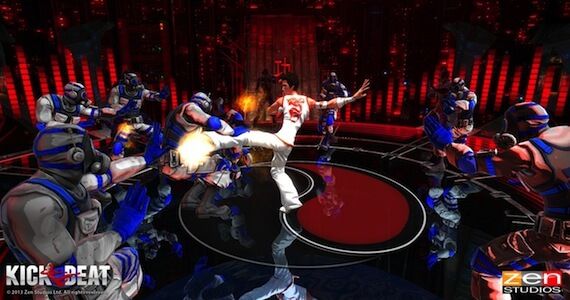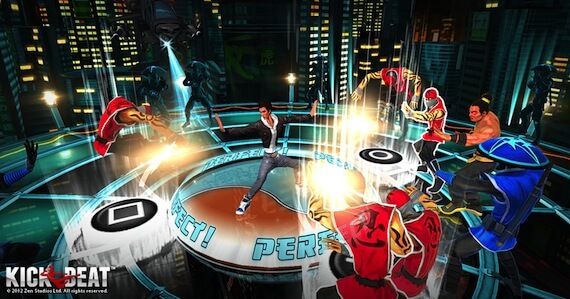Zen Studios' KickBeat is a PS Vita and PS3 rhythm game with its own personality. Rather than package the timing-based gameplay simply with musically informed button presses, Zen Studios packages the product around fighting.
It's a novel idea, one that helps KickBeat stand out from the myriad rhythm games (Rock Band, Rocksmith, etc.) that are available, but it's also one that hampers the game's overall success. That doesn't mean it isn't worth a look for die-hard fans of the rhythm genre, though.
KickBeat's general set-up is this: players take control of Lee, a teenager working to save the "Music Sphere." How Lee will do is that is by taking out hordes of ninjas, wrestlers, and robots as if he were channeling Bruce Lee in Enter the Dragon. Like in any good martial arts flick, Lee stands in the center of a pile of baddies, waiting for each enemy to attack "in turn."
The narrative packaging for KickBeat is overly silly, and completely forgettable, but the decision to add some rhyme and reason (no pun intended) to the proceedings is admirable. It helps the game standout as more than just a generic rhythm experience, even if the story itself isn't worth paying attention to.
Where the game also puts its own unique foot forward is with its rhythm-based gameplay. Rather than simply tapping the face buttons in time with the music, players are tapping in time with enemy attacks based on their position which coincides with one of the four buttons. In essence, players are fighting with the music. Some enemies require a basic button press, while others require a more challenging double press, or hold and release, or even the dual button press. The end goal, as in most games of this ilk, is to obtain the highest score possible by sustaining a long note streak, using the "Chi" score multiplier when necessary, and even activating a few power-ups to survive the more challenging sections.
There are also a few boss battles thrown into the mix, which, at the end of the day, have the same basic template, but are unique in that it's a single enemy. Despite all that, though, Kickbeat is pretty standard fare as far as rhythm games go, only instead of tapping on nebulous floating notes, players are taking out bad guys at the same time.
It takes some time to get used to, but once players do, KickBeat does well as a unique twist on the rhythm genre. There are some flaws that hold it back, and some that make it outright frustrating, but most of those problems are manageable, even if they are not forgivable.
The gameplay is, of course, bolstered by a track list featuring a few notable artists (P.O.D., Marilyn Manson, Rob Zombie) and a lot of house music. The lackluster track list isn't a deal breaker, but gamers who seek out rhythm games specifically for contemporary tracks will find that KickBeat is decidedly bare in that department.
In addition to a pretty ho-hum track list, the game also fails to time the button presses all that well with the music. It's almost as if the game arbitrarily selects which part of the track to time the gameplay with, and switches that up on the fly. At one point, players might be tapping out enemies in time with the bass while the next moment they're supposed to keep tempo with the vocal track. For a game that is supposed to fit into the rhythm genre, the actual rhythm part is pretty disappointing. Players will have greater success focusing on the enemies rather than the music.
On top of that, the game's visuals do their best job of getting in the way of seeing the enemies or anticipating upcoming "notes," which further derails the experience. When it's hard to anticipate which enemy will attack first, or even trying to plan a successive series of button presses, it's easy to fail a track almost instantly. In KickBeat's case that means losing all of Lee's health. See, instead of failing because of lost momentum, each missed button press tallies up towards a fail, which is a frustrating way to manage track progression.
What KickBeat does to evolve the rhythm genre is smart, it's just sorely lacking in execution. The idea of a rhythm game that uses hand-to-hand combat as a gameplay template makes KickBeat stand out, but when it comes time to actually play the game, the experience wavers between decent fun and frustration. Too many tiny problems, like a distracting camera or odd timing for music tracks, make getting through each level feel more like a chore. Some fans of the rhythm genre will come away from KickBeat satisfied based purely on its unique gameplay conceit, but the game's frustrating design hurts its chances for more mainstream appeal.
Does KickBeat sound like a rhythm game that might be worth your time? Have you had a chance to play the game? What do you think?
KickBeat is available now for the PS3 and Vita. Game Rant was provided a game code for this review.




